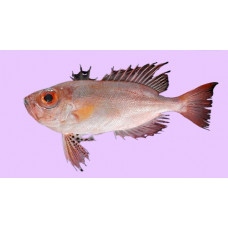Latin name
Priacanthus tayenus
Other name
Priacanthus tayenus
Identification
A feature of this species is the well-developed spine at the corner of the preopercle.
Features of fish fins
The caudal fin of juveniles is truncated, but in some large individuals (possibly males) it becomes semilunar.
Fish colouring
The purple-spotted bigeye is red to silver-white with pink tinges. The pelvic fins are covered with small purple to black spots with one or two larger spots closer to the belly. Distribution
Widespread in the Indian and Pacific Oceans. Indo-West Pacific: from the Persian Gulf to the west coast of India, east to the Pacific Ocean, where it occurs from Taiwan south to the Arafura Sea and northern Queensland, Australia.
Habitat
A tropical marine species associated with reefs. Its depth range is 20-200m.
Size
The maximum length of a male of this species is 35 cm. The total length of the same species is 25 cm.
Behavior
Occupies coral or rocky areas. Sometimes forms schools. Small fish live mainly near the shore.
Food and feeding habits
Eats a variety of bottom-dwelling animals.
Reproduction
Nothing is known about the breeding biology of the Purple-spotted Bigeye.
Fishing
Of minor commercial importance in fisheries.
Relationship with a person
Harmless. It is usually sold fresh, whole or dried and salted.
| Classification | |
| Phylum | Chordata |
| Class | Actinopterygii |
| Squad | Acanthuriformes |
| Family | Priacanthidae |
| Genus | Priacanthus |
| Species | P. tayenus |
| Features | |
| Conservation status | Least Concern |
| Habitat | Pelagic |
| Life span, years | No information |
| Maximum body weight, kg | No information |
| Maximum length, cm | 35 |
| Sailing speed, m/s | No information |
| Threat to people | Edible |
| Way of eating | Bentophage |
Purple-spotted bigeye
Tags: purple spotted bigeye

